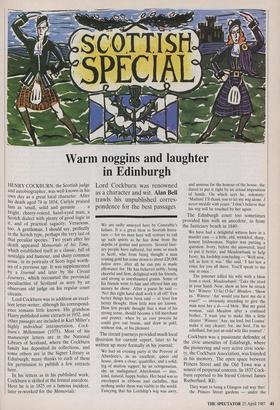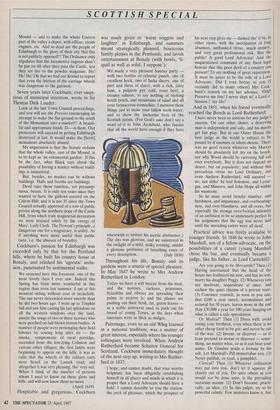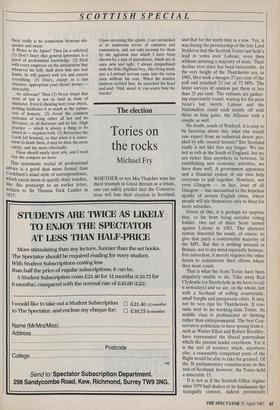Warm noggins and laughter in Edinburgh
Lord Cockburn was renowned as a character and wit. Alan Bell trawls his unpublished corres- pondence for the best passages
HENRY COCKBURN, the Scottish judge and autobiographer, was well known in his own day as a great local character. After his death aged 74 in 1854, Carlyle praised him as 'small, solid and genuine . . . a bright, cheery-voiced, hazel-eyed man; a Scotch dialect with plenty of good logic in it, and of practical sagacity. Veracious, too. A gentleman, I should say, perfectly in the Scotch type, perhaps the very last of that peculiar species.' Two years after his death appeared Memorials of his Time, which established itself as a classic, full of nostalgia and humour, and sharp common sense, in its portraits of Scots legal worth- ies of a previous age. It was supplemented by a Journal and later by the Circuit Journeys, which recounted the provincial peculiarities of Scotland as seen by an observant old judge on his regular court circuits.
Lord Cockburn was in addition an excel- lent letter-writer, although his correspond- ence remains little known. His grandson Harry published some extracts in 1932, and other passages are included in Karl Miller's highly individual interpretation, Cock- burn's Millennium (1975). Most of his manuscript letters are in the National Library of Scotland, where the Cockburn family has deposited its collections, and some others are in the Signet Library in Edinburgh; many thanks to each of them for permission to publish a few extracts here.
In his letters as in his published work, Cockburn is skilled at the formal anecdote. Here he is in 1825 on a famous incident, later re-worked for the Memorials:
We are sadly annoyed here by Constable's failure. It is a great blow to Scottish litera- ture — for no man here will venture to call up such spirits as he has done from the depths of genius and poverty. Several liter- ary people have suffered, but none so much as Scott, who from being thought a man coining gold has come down to about £20,000 below zero, after all he can pay is made allowance for. He has behaved nobly, being cheerful and firm, delighted with his friends, and strong in unexhausted genius. Some of his friends went to him and offered him any money he chose. After a pause he said 'No! this right hand shall work it all off!' Few better things have been said — at least few better thought. How little men are known. How few people thought that a man of his strong sense, should become a bill merchant and printer, when by an easy process he could give out brains, and draw in gold, without risk, at his pleasure.
The circuit journeys provided much local diversion for current report, later to be written up more formally in his journal: We had an evening party at the Provost of Aberdeen's, in an excellent, queer old house, down a close; quadrilles, and a solid, leg of mutton supper; he an octogenarian, she an undisguised Aberdonian — nice, kind, natural, happy bodies. Her head was so enveloped in ribbons and carfufles, that nothing under them was visible to the world. Fancying that his Lordship's wig was awry,
and anxious for the honour of the house, she dared to put it right by an actual imposition of hands. On which says he, solemnly: 'Madam! I'll thank you to let my wig alone. I never meddle with yours.' I don't believe that his wig will be touched by her again.
The Edinburgh court too sometimes provided him with an anecdote, as from the Justiciary bench in 1840:
We have had a delightful witness here in a murder case — a little, old, wrinkled, sharp, honest Irishwoman. Napier was putting a question. Ivory, before she answered, tried to put it better, and Meadowbank to help Ivory, his lordship concluding — 'Well now, tell us how it was.' She said, 'I hav'not a voice for you all three. You'll speak to me one at once.'
The prisoner killed his wife with a blow from a stool. Meadowbank: 'Take the stool in your hand. Now, show us how he struck her.' Witness: '0 fie! 0 fie!' Meadow : 'Show us.' Witness: 'An' would you have me do it exact?' — obviously intending to give the man next her a d—d blow. Tut my good woman,' said Meadow after a confused bother, 'I want you to make this a little clearer.' Witness: 'Aye, me lord, but I canna' make it ony clearer; for, me lord, I'm no schollard, but just an ould wife like yoursel'.'
Cockburn was a passionate defender of the civic amenities of Edinburgh, where the pioneering and very active civic socie- ty, the Cockburn Association, was founded in his memory. The open space between Princes Street and the Old Town was a source of perpetual concern. In 1837 Cock- burn reported to his friend Colonel James Rutherfurd, RE:
They want to bring a Glasgow rail way thro' the Princes Street gardens — under the
SCOTTISH SPECIAL
Mound — and to make the whole Eastern part of the valley a depot, with offices, steam engines, etc. And so dead are the people of Edinburgh to the glory of their city that this is not publicly opposed!!! The Ordnance only stipulates that the locomotive engines shan't be put on till after they pass the Castle, lest they set fire to the powder magazine. He! He! He! Oh that we had our Kornel to report that even the friction of the carriage wheels was dangerous to the garrison.
Seven years later Cockburn, ever suspi- cious of municipal intention, wrote to Sir Thomas Dick Lauder: Look at the last Town Council proceedings, and you will see the Provost encouraging an attempt to make the flat ground to the south of the Monument into a market!!! A beauti- ful and appropriate finish. D—n them. Our protectors will succeed in getting Edinburgh destroyed at last. It would make the [Scott] monument absolutely absurd.
My impression is that the Statute ordains that the whole valley, east of the Mound, is to be kept as 'an ornamental garden'. If this be the fact, what Black says about the possibility of having a market without build- ings is immaterial.
But, besides, no market can be without buildings. Halls and booths are buildings.
Devil take these tasteless, yet presump- tuous, beasts. It is only ten years since they wanted to have the gallows erected on the Calton Hill; and it is not 35 since the Town Council actually approved of a row of public privies along the northern slope of the Castle Hill, from which truly magisterial decoration we were rescued solely by the energy of Mary, Lady Clerk. The Provost's principle, a dangerous one for a magistracy, is utility. As if anything were more useful than public taste, i.e. the absence of brutality.
Cockburn's passion for Edinburgh was exceeded only by that for the Pentland hills, where he built his country house at Bonaly, and relished his `agrestic' seclu- sion, punctuated by sentimental walks:
We returned here this forenoon, one of the most lovely days I ever saw. Indeed this Spring has been more wonderful in this region than even last summer. I am at this moment sitting without coat or neckcloth. The sun never descended more sweetly than he did two hours ago. I went up to Torphin hill and saw him casting his last splendour on all the western windows over the land, amidst the songs of two or three mavises who were perched on full-blown broom bushes. A number of people were prolonging their field labours by sowing long after six — the smoke, symptomatic of rural porridge, ascended from the low-lying Colinton and various other villages; the first lambs were beginning to appear on the hills; it was so calm that the wheels of the solitary carts were heard on the Lanark road; and altogether it was very pleasing, tho' very sad. When I think of the number of persons whom I used to know on these glens and hills, and will now know there no more . . . .
(April 1819) Hospitable and gregarious, Cockburn
was much given to 'warm noggins and laughter' in Edinburgh, and summers meant strategically planned, boisterous family picnics in the Pentlands, and lavish entertainment at Bonaly (with bowls, 'li- quid as well as solid, I suppose'):
We made a very pleasant Sunday party with two bottles of celestial punch, one of excellent hock, two of India sherry, one of port and three of claret; with a rich, juicy ham, a pidgeon pye cold, roast beef, a creamy • salmon, to say nothing of reeking hotch potch, and mountains of salad and all your farinaceous stomachics. I mention these things just to make your fallow teeth water, and to show the anchorite lives of the Scottish jurists. (For God's sake don't say a word of it to John Archibald, who fancies that all the world have enough if they have wherewith to imitate his ascetic abstinence.) The day was glorious, and we sauntered in the twilight of a mild, milky evening, amidst a glorious profusion of breathing roses of every description. (July 1836)
Throughout his life, Bonaly and its gardens were a source of special pleasure. In May 1847 he wrote to Mrs Andrew Rutherfurd in London:
Today we have a soft breeze from the west, and the mavises, cuckoos, primroses, hyacinths and ribeses are spreading their palms to receive it; and the planes are pushing out their fresh, fat, green leaves as a noble aristocrat used to push out his brood of young Tories, in the days when sinecures were as thick as midges.
Patronage, even to an old Whig learned in a national tradition, was a matter of great interest, especially where his younger colleagues were involved. When Andrew Rutherfurd became Solicitor General for Scotland, Cockburn immediately thought of the next step up, writing to Mrs Ruther- furd in 1837: I hope, and cannot doubt, that your worthy helpmate has been diligently establishing himself in all places and minds in which it is proper that a Lord Advocate should have a hold. I cannot describe to you the elation, the peck of pleasure, which the prospect of
his next step gives me — dashed tho' it be, in other views, with the anticipation of long absences, unthanked virtue, much anxiety, and very great professional risk. But the public! A good Lord Advocate! And the unquestioned command of any fixed legal honour that this poor devil of a country can present! To say nothing of great reputation. It must be queer to be the wife of a Lord Advocate. Did I ever betray to you (I certainly did to many others) Mrs Cock- burn's remark on my last advance. 'Odd! Preserve me this! I never slept wi' a Lord o' Session i' my life!'
And in 1851, when his friend eventually reached the Bench as Lord Rutherfurd:
I have never been so anxious for any judge's success. On our other chairs, a deserving man is independent and safe, and his merits get fair play. But in our Outer House the best judge in the world is subject to be passed by if enemies or idiots choose. There was no good reason whatever why Murray should be absolutely left dry on the beach; nor why Wood should be careering full sail
over everybody. But it does not depend on desert, but on popularity; and without this
precarious virtue no Lord Ordinary, not even Andrew Rutherfurd, will succeed no, not altho' he had Solomon, and Lycur- gus, and Minerva, and John Hope all within his waistcoat.
So he must avoid benchy slumber, and harshness, and impatience, and overbearing-
ness, and over-blandness, and all overs, but especially the strange over-Ivorian infirmity of an ambition to be so immensely perfect in his judgments that the egg was never laid until the intending eaters were all dead.
Practical advice was freely available to younger friends. In 1848 he wrote to John Marshall, son of a fellow-advocate, on the possibilities of a career (young Marshall chose the bar, and eventually became a judge, like his father, as Lord Curriehill): Are you going to be Mercantile? Then (1) Having ascertained that the head of the house has feathered his nest, and has no son, marry his daughter Peggy. (2) Whenever you are insolvent, sequestrate at once, and eschew the quiet charms of a private trust. (3) Convince yourself, as soon as you can, that £100 a year saved, accumulated and secured for 50 years, leaves more in the end than £30,000 a year for 100 years hanging on what is called a safe speculation. Or Medical? Then (1) Dress well; avoid eating your brethren, even when there is no other cheap food to be got; and never be out of the way. (2) Invent, or discover — or at least pretend to invent or discover — some- thing, no matter what, so as it can bear your name. Dr Glauber made a fortune by his salt. Let Marshall's Pill immortalise you. (3) Never publish, or read, a pamphlet.
Clerical? Then (1) Whatever ordination may put into you, don't let it squeeze all charity out of you. Do unto others as you would not be done unto, is the prevailing sectarian maxim. (2) Don't become, practi- cally, an idiot. (3) In this pulpit, try to be powerful calmly. Few ministers know it, but
SCOTTISH SPECIAL
there really is no connection between elo- quence and sweat.
A Writer to the Signet? Then [as a solicitor] (1) Don't fancy that general ignorance is a proof of professional knowledge. (2) Deal with every employer on the anticipation that whenever his folly shall drive him into bad hands, he will quarrel with you and contest everything. (3) Don't, except as a last resource, appropriate your clients' money — detectably. An Advocate? Then (1) Never forget that want of law is not so fatal as want of character. Even if cheating were your object, nothing facilitates it so much as the reputa- tion of honesty. (2) Avoid the common extremes of being either all law and no literature, or all literature and no law. High practice — which is always a thing to be aimed at — requires both. (3) Reverence the Lords [of Session], so that when it is conve- nient to insult them, it may be done the more safely, and the more effectually.
These should surely steer you, and I need box the compass no more.
This systematic recital of professional advice is a good deal more formal than Cockburn's usual style of correspondence, which excels more in quietly doric touches, like this postscript to an earlier letter, written to Sir Thomas Dick Lauder in 1815: Upon surveying this epistle, I am astonished at. its numerous errors of omission and commission, and can only account for them by the agitation into which I have been thrown by a pair of pantaloons, which are at once new and tight. I always sympathised with the little Highland boy, who being made into a Lowland servant came into the room once without his coat. When his maiden mistress scolded him, he scratched his head and said, 'Odd, mem! A' can scarce bide the breeks!'




































































 Previous page
Previous page